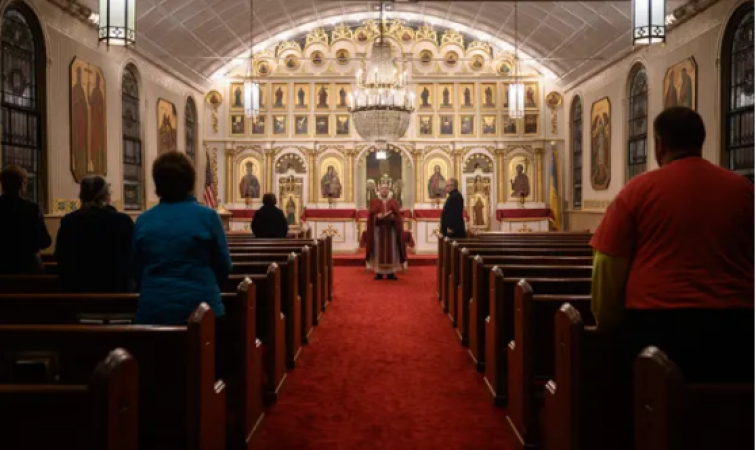
UK: As congregations dwindle across the country and a younger generation of Americans reject Christianity altogether, researchers report that churches in the US are closing at a faster rate - on the politics of religion Despite being dominant.
The number of churches closing each year in the US is in the thousands, a trend that experts believe may accelerate since the COVID-19 pandemic as the country adapts to a population that is becoming less religious.
Pastors must make some difficult choices as they determine when a shrinking congregation can no longer be supported. But as former places of worship are now finding new life, it has also created a booming market for those looking to buy churches.
Also Read: Man sues the Denver Archdiocese for the misconduct of the convicted priest
According to Lifeway Research, nearly 3,000 new churches were established while 4,500 Protestant churches closed in 2019, the most recent year for which data is available. Since the Evangelical Company began researching the topic, it was the first time that the number of churches in America had not increased. According to the researchers, the closures will only accelerate as the pandemic accelerates and Americans turn away from Christianity.
The closures affected many churches, even if they were only temporary. According to Scott McConnell, executive director of Lifeway Research, "People breaking the habit of attending church meant that many churches had to work hard to get people to attend again."
Given the sharp increase in Americans identifying as non-religious over the past three years, all signs point to the pace of closure in at least 2019 or even faster.
Research by the Survey Center on American Life and the University of Chicago found that 67% of Americans in the spring of 2022 reported attending church at least once a year, compared to 75% before the pandemic, Protestant pastors reported that typical church attendance is only 85% of pre-pandemic levels.
However, despite the possibility that COVID-19 has accelerated the decline, the trend of people moving away from religion has been going on for a long time. Lifeway conducted a survey of young adults (ages 18 to 22) who had attended church regularly for at least one year during high school in 2017. According to the company, seven out of ten people had stopped attending church regularly.
Also Read: Abyan operations are intended to eliminate Al-Qaeda terrorists
According to McConnell, some of the reasons people had trouble attending church were "logical" because they had moved away for college or started new jobs.
However, some of the other responses don't really involve logistics. One of the most popular responses was that church-goers seemed critical or hypocritical, according to McConnell.
So either the younger generation does not feel that they belong in a church setting or some of their decisions are not accepted by the church goers.
According to McConnell, nearly a quarter of young adults who left the church expressed disagreement with the organization's position on social and political issues.
According to a Pew Research study, 64% of Americans identified as Christian in 2020, while 30% of Americans were classified as "religiously unaffiliated". About 6% of Americans said they were Buddhist, Hindu, Muslim, or Judaic.
"Since the 1990s, a significant portion of Americans have abandoned Christianity and joined a growing number of American adults who identify as atheists, agnostics, or "nothings," according to Pew. Huh.
"This fast trend is changing the religious landscape in America."
According to Pew Research, in 1972 92% of Americans identified as Christians. However, by 2070, this percentage will drop to less than 50%, and the number of "religiously unaffiliated" Americans, also known as "none", is likely to exceed Christians.
According to Stephen Bullivant, author of Nonverts: The Making of Ex-Christian America and professor of theology and sociology of religion at Saint Mary's University, there has been a generational change in the Christian community.
Even if their grandparents may have been devout Christians, their offspring will claim to have a strong belief in God but will not attend church regularly. When the Millennial generation arrived, they had little previous exposure to religion or church.
The sex abuse scandal may have alienated those who had only a tenuous connection to faith, especially in the Catholic Church.
The pandemic is another issue, according to Bullivant.
Many people who were only loosely connected are now thinking, "Well, we don't really need to go," "We've got to do something else," or "It was hard enough to drag the kids along." We really need to start going again... next week."
Bullivant claimed that while most other countries experienced the move away from religion earlier than the US, there were unique factors in the US that caused things to move more slowly.
According to Bullivant, "Canada, Britain, France, Australia, and New Zealand, nones rise much earlier, the baby boom generation after the 1960s, and this kind of big, growing separation of kind of traditional Christian moral morality."
Also Read: Two people including a teacher were killed by an Israeli attack in the West Bank
"The cold war, in my opinion, slows down the rise of the nones in America. Because there is a very explicit framing of "Christian America" versus "godless communism" in America, unlike in Britain, and being atheist is considered to be un-American.